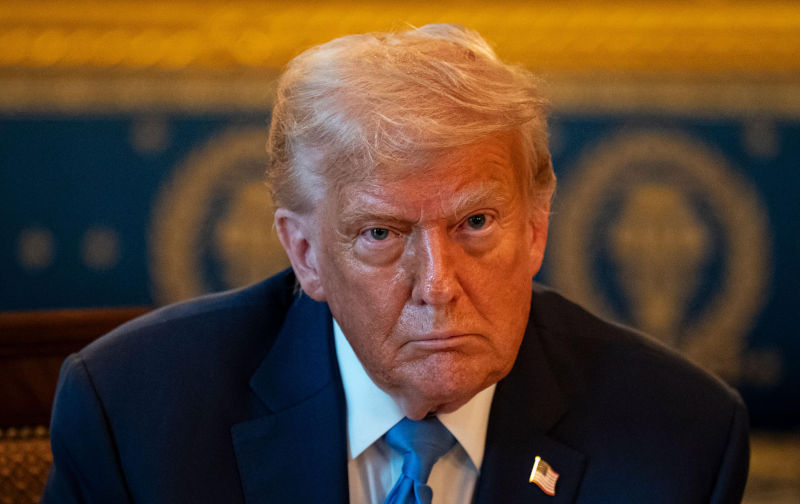Trump and the post-American world
September 8, 2025
Donald Trump’s blatant campaign for a Nobel Peace Prize has a new claim for his resume – his “diplomacy” is contributing to a new world order.
Unfortunately, it is a world order that not only lacks a place for the US, but actively excludes the US. This world order is contributing to the burgeoning ties between Russia and China, which are without precedent, as well as among China, India, North Korea and Russia. US relations with each of them are in decline. Relations between the US and India are the most recent victim in the formation of the new world order.
The US had been the key to understanding the world order created at the end of World War II. For the first time in 80 years, the US is on the outside looking in, not only in Europe, but in the Indo-Pacific as well. Washington’s decline can be perceived in terms of power, influence, credibility and standing. For the first time in 80 years, the US lacks an influential national security team that can work closely with a president who has peculiar ideas about policy and process. The fact that Marco Rubio serves as both secretary of state and acting national security adviser (and has very limited influence in either capacity) speaks to the problem. As a result, Rubio has thrown his powers into limiting visas for foreigners, particularly for foreign students, a key factor in US isolation.
Trump has gone out of his way to isolate the US in the global community. His latest action was the denial of visas to members of the Palestinian Authority and the Palestine Liberation Organisation to attend this month’s UN General Assembly in New York. This comes at a time when key US allies (Britain, France, Canada and Australia) are planning to join 147 UN members that already recognise a Palestinian state.
The denial of the visas for the PLO violates the 1947 UN charter, which states that the US “shall not impose any impediment” to the travel of representatives of the UN missions to the “headquarter district” in New York City. This visa ban will affect more than 80 Palestinians as well as the president of the Palestinian Authority, Mahmoud Abbas. (In 1988, the General Assembly met in Geneva so that Palestinian leader Yasser Arafat could address the assembly.) This week, the Trump administration suspended all types of visas for all Palestinians.
Sino-Russia: China and Russia have never had a relationship as close as the one that currently exists. There are multiple reasons for this, but the actions of the Trump administration are central to the forging of these close ties. Joint military exercises are a key part of the current situation as well as the generous exchange of military intelligence and weaponry. The convergence of Moscow and Beijing contrasts with the growing discord between the US and its allies in Europe and Asia.
Sino-Russia-India: This week’s summit of the Shanghai Co-operation Organisation, a Eurasian security group led by Moscow and Beijing, brought Indian Prime Minister Narendra Modi to China for the first time in seven years. Again, Trump was the catalyst for Modi’s decision due to Trump’s tariff policies and taking false credit for the ceasefire between India and Pakistan several months ago. Xi’s diplomacy played a major role in bringing India closer to both Moscow and Beijing. Xi gained from making sure that India would not join Washington’s policy of containment against China.
Sino-Russia-North Korea: Kim Jong-un’s attendance at the summit in China marks an important step in ending the discord between Beijing and Pyongyang. Kim’s relations with Moscow are also on solid ground in view of the military support from North Korea for Russia’s war with Ukraine. Trump’s mishandling of the recent meeting with South Korean President Lee Jae-myung and a tough trade policy with Japan are additional points of contrast.
BRICS: The founding countries of Brazil, Russia, India, China and South Africa have added Egypt, Ethiopia, Indonesia, and the United Arab Emirates to the fold in an effort to form an alternative to the G7. Its objectives are anti-Western and anti-US. The Israeli genocide and US complicity, as well as Trump’s tariff and trade policies, have added to BRICS’ popularity and credibility.
US-India: Until recently, India, the world’s largest democracy, and the US were on course to create a cordial and reciprocal diplomatic and economic policy where both sides could accommodate each other. Trump has virtually brought this policy line to a halt with a doubling of tariffs on India exports. At the same time, the US and India have created troubled democracies.
Finally, the Trump and Biden administrations have both contributed to the isolation and alienation of the US in the international community with their complicity in Israel’s profane genocide of the Palestinians in Gaza. Trump’s postwar plan, modelled on his notion to make Gaza the “Riviera of the Middle East”, would create a US-administered trusteeship in Gaza for at least 10 years, while it is turned into a tourist resort. Only real estate barons such as Trump, his son-in-law Jared Kushner and Steve Witkoff could come up with such a cynical and exploitative idea. The fact that some of the same Israelis, who created the dysfunctional Gaza Humanitarian Foundation that failed to distribute food to the starving masses in Gaza, are involved completes the hideous picture of Israeli genocide.
Meanwhile, the rubble in Gaza continues to mount, and deceitful Israelis continue to deny that famine exists.
Republished from CounterPunch, 4 September 2025
The views expressed in this article may or may not reflect those of Pearls and Irritations.

